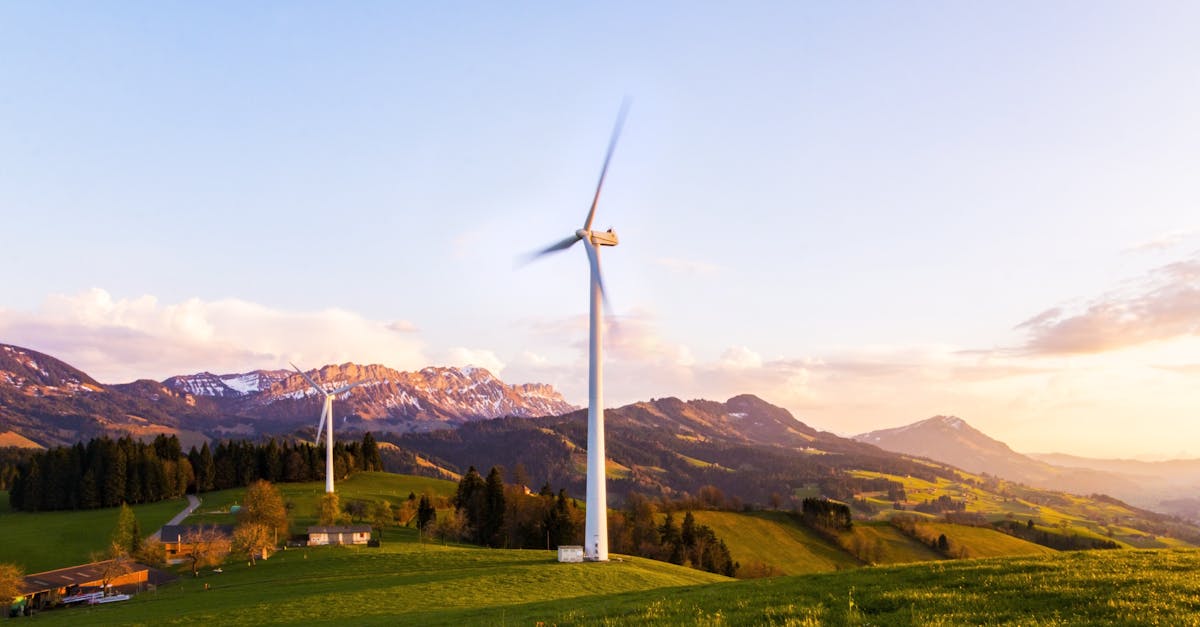Renewable energy is becoming an increasingly important focus in today’s world, as we recognize the need to shift from fossil fuels to cleaner and more sustainable energy sources. This transition not only benefits the environment, but it also creates a demand for skilled professionals in the renewable energy sector. If you’re considering a career path that combines purpose, impact, and potential, then renewable energy may be the field for you.
In this article, we will take a deep dive into the world of renewable energy careers, exploring the different types of jobs available, the educational requirements, job market outlook, and future prospects of this fast-growing industry. So if you’re ready to power up your future, let’s get started!
Importance of Renewable Energy
The use of renewable energy sources has become a critical part of the global effort to combat climate change and reduce our carbon footprint. According to the International Renewable Energy Agency (IRENA), renewable energy accounted for around 26% of global electricity generation in 2018, with the potential to reach 50% by 2030. This growth is driven by several factors, including government policies and incentives, advancements in technology, and increasing consumer demand for clean energy options.
Renewable energy not only helps to reduce greenhouse gas emissions, but it also provides economic benefits by creating jobs, reducing dependence on imported fossil fuels, and promoting energy independence. Therefore, it’s not surprising that countries around the world are investing heavily in renewable energy, with the goal of achieving a more sustainable and secure future.
Types of Careers in Renewable Energy
The renewable energy sector offers a wide range of career opportunities, from engineering and project management to research and development. Some of the most popular job roles in this field include:
Solar Energy Career Paths
- Solar Photovoltaic Installers: These professionals install and maintain solar panels on rooftops or other structures using specialized tools and equipment. They need to have a good understanding of electrical systems, as well as excellent problem-solving skills.
- Solar Engineers: These engineers design and develop solar energy systems for residential, commercial, or industrial use. They are responsible for selecting the right components, optimizing system performance, and ensuring compliance with safety standards.
- Solar Sales Professionals: Solar energy companies require sales professionals to promote their products and services to potential customers. These individuals should have excellent communication skills and a good understanding of renewable energy technologies.
Wind Energy Career Paths
- Wind Turbine Technicians: These technicians install, maintain, and repair wind turbines. They also conduct regular inspections and troubleshoot any issues that arise. This role typically requires a strong mechanical aptitude and the ability to work at great heights.
- Wind Energy Project Managers: Project managers in the wind energy sector oversee the development, construction, and operation of wind farms. They are responsible for managing budgets, timelines, and resources to ensure project success.
- Wind Resource Analysts: These analysts use complex software and weather data to assess the potential of wind energy at a particular site. They also conduct feasibility studies and provide recommendations for optimal turbine placement.
Hydropower Career Paths
- Hydropower Plant Operators: These professionals operate and maintain hydropower plants, which generate electricity from the flow of water. They monitor equipment, adjust controls, and perform routine maintenance tasks to ensure efficient plant operations.
- Hydroelectric Project Engineers: Hydroelectric project engineers are involved in the design, construction, and management of hydropower facilities. They need to have a solid understanding of engineering principles, as well as project management skills.
- Environmental Scientists: Environmental scientists play a crucial role in hydropower projects by assessing potential impacts on the environment and developing mitigation strategies. They may also conduct research to improve the sustainability of hydropower operations.
Geothermal Energy Career Paths
- Geothermal Technicians: These technicians assist in the installation and maintenance of geothermal heating and cooling systems. They also troubleshoot equipment issues and perform repairs as needed.
- Geothermal Engineers: Geothermal engineers design, develop, and test geothermal energy systems for residential, commercial, or industrial use. They need to have a strong background in engineering principles and thermal dynamics.
- Geoscientists: Geoscientists study the Earth’s structure, composition, and processes to determine the potential for geothermal energy at a particular location. They may also be involved in drilling operations and resource management.
Biomass Energy Career Paths
- Biomass Power Plant Operators: These operators are responsible for the day-to-day operations of biomass power plants, which convert organic matter into energy. They monitor equipment, maintain logs, and troubleshoot malfunctions to ensure smooth plant operations.
- Bioenergy Project Managers: Bioenergy project managers oversee the planning, implementation, and evaluation of bioenergy projects. They also manage budgets, timelines, and resources to ensure project success.
- Biofuel Chemists: Biofuel chemists conduct research and experiments to develop new biofuels and improve existing ones. They may also work on developing more efficient conversion processes and improving the quality of biofuels.
Educational Requirements for Renewable Energy Careers
The specific educational requirements for renewable energy careers vary depending on the job role and employer. However, most positions in this field require a combination of technical knowledge, practical skills, and hands-on experience. Some common educational paths for renewable energy professionals include:
- Associate’s or Bachelor’s degree in a relevant field: Many entry-level roles in renewable energy require a minimum of an associate’s degree, while some may prefer a bachelor’s degree. Common areas of study include engineering, physics, environmental science, and renewable energy technology.
- Master’s degree or higher: For more senior positions, a master’s degree or higher in a relevant field may be required. This is often the case for research and development roles, as well as management positions.
- Industry certifications: Many employers look for specific certifications that demonstrate a candidate’s expertise in a particular area of renewable energy. These may include certifications in project management, solar installation, wind turbine maintenance, and more.
Job Outlook and Growth in the Renewable Energy Sector

The renewable energy sector has been experiencing rapid growth over the past decade, and this trend is expected to continue in the coming years. According to a report by the International Renewable Energy Agency (IRENA), the renewable energy industry supported 11 million jobs worldwide in 2018, with the potential to create 42 million jobs by 2050.
In the United States alone, employment in the solar and wind sectors grew by 167% and 262%, respectively, between 2010 and 2020. This growth is projected to continue, with the U.S. Bureau of Labor Statistics (BLS) estimating a 22% increase in wind technician jobs and a 33% increase in solar installer jobs from 2019 to 2029.
The job market outlook is also positive for other types of renewable energy, with the BLS projecting a 4% increase in employment for hydrologists and a 6% increase for environmental scientists and specialists from 2019 to 2029.
Skills and Qualities Needed for Renewable Energy Careers
To be successful in the renewable energy industry, there are several essential skills and qualities that employers look for in candidates. These include:
- Technical Knowledge: Depending on the job role, candidates may need to have a strong background in areas such as engineering, physics, chemistry, or environmental science.
- Problem-Solving Skills: Renewable energy professionals must be able to identify and troubleshoot issues quickly and effectively to ensure the smooth operation of systems and projects.
- Teamwork and Communication: Many roles in renewable energy require collaboration with colleagues, contractors, and other stakeholders. Therefore, strong teamwork and communication skills are crucial.
- Attention to Detail: Whether it’s installing solar panels or conducting research, attention to detail is essential in the renewable energy field to ensure accuracy and safety.
- Flexibility and Adaptability: Renewable energy is a rapidly evolving industry, and professionals must be able to adapt to new technologies, regulations, and market conditions.
- Passion for Sustainability: A genuine interest in renewable energy and sustainability is a must for anyone looking to build a career in this field.
Case Studies of Successful Professionals in Renewable Energy
To give you a better understanding of what a career in renewable energy can look like, let’s take a look at two case studies of successful professionals in the industry.
Case Study 1: Debra Smith – Solar Engineer
Debra Smith always had a passion for sustainability and renewable energy. After completing her bachelor’s degree in mechanical engineering, she landed an internship at a solar energy company. During her internship, she worked on several projects, including designing a solar-powered water pumping system for a rural community.
After her internship ended, Debra was offered a full-time position as a solar engineer at the same company. In this role, she has been involved in designing and developing solar energy systems for residential and commercial use. She has also mentored several interns and managed multiple projects simultaneously.
Debra loves her job as it allows her to use her technical skills while making a positive impact on the environment. She plans to continue advancing her career in the renewable energy sector, with a goal of one day starting her own solar energy company.
Case Study 2: John Nguyen – Wind Turbine Technician
John Nguyen has always been interested in hands-on work and has a natural aptitude for mechanical systems. After completing a two-year degree in wind energy technology, he landed an entry-level job as a wind turbine technician.
John’s role involves conducting regular maintenance, troubleshooting equipment, and performing repairs on wind turbines. He also assists in the installation of new turbines and conducts safety inspections. He enjoys working outdoors and being part of a team that is making a positive impact on the environment.
John plans to continue gaining experience and certifications in the wind energy field, with a goal of eventually becoming a project manager or starting his own wind energy company.
Conclusion and Future Outlook

The future looks bright for renewable energy careers, with the industry expected to see continued growth and demand for skilled professionals. This not only offers exciting opportunities for those looking to build a career in this field but also contributes to a more sustainable and secure future for all.
If you’re passionate about clean energy and have the necessary skills and qualifications, now is the time to join the renewable energy revolution. With diverse career paths, excellent job market outlook, and the chance to make a positive impact, there’s never been a better time to power up your future with renewable energy.


